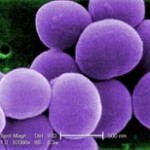MRSA Testing: What is it? Why is it Important?
What is a MRSA test?
The only way to know if you have MRSA is by getting tested. You can look at infection photos and read all about the symptoms, but only a test can confirm what is causing your infection. Knowing what’s causing your infection is the first step to getting the right treatment and speeding your recovery.
There are different kinds of MRSA tests and the simplest and most common one (the culture test) is described below. Newer DNA based tests that are faster than culture tests can even produce results in a few hours. You can find out why testing is important lower down on the page.

The culture test takes a sample of your infection and grows the bacteria on a plate so it can be identified.
The MRSA culture test
A culture test identifies what specific type of bacteria is causing your infection. The culture test is very simple, easy to perform and is relatively inexpensive. The first part of the test can be performed in your doctor’s office in just a few minutes. It then will take a few days to get the results back from the lab.
A culture test is performed as follows:
- For skin infections, a swab sample is taken from the infected area.
- Pus or fluid may also be collected from weeping wounds, abscesses or other types of skin infections.
- Sputum may be collected for lung infections.
- For bladder or urinary infections, urine can be collected and tested
- The swab (or sample) is then sent to a laboratory where the bacteria from the swab are grown on a round agar plate (a nutrient growth medium).
- After growing enough bacteria (usually within 1-3 days), methods are used to identify the specific bacteria.
- The test results are sent back to your doctor, identifying what type of bacteria is causing your infection.
Note: Your throat or nose may be sampled if you have an existing infection to see if you are a MRSA carrier. Testing the throat or nose is also commonly performed before getting surgery, as carriers have an greatly increased chance of getting a MRSA infection.
Be aware that your doctor may not perform a culture test. Many doctors routinely prescribe a broad spectrum antibiotic for an infection without knowing exactly what’s causing it. However, broad spectrum antibiotics do not work against MRSA and can cause even greater infection, or worse yet, create antibiotic resistance in a general Staph infection.
If you think you have MRSA, asking your doctor for a culture MRSA test will help them prescribe a more effective antibiotic. Testing takes much of the guess work out of selecting the best conventional treatment. If your test is positive for MRSA, the next step is getting a susceptibility test to narrow down what antibiotic is best (see next section). Because of the many negative antibiotic side effects and gaining antibiotic resistance, you may prefer a natural or alternative treatment that can help your infection as well.

The antibiotic susceptibility test examines several different drugs to see which one does the best job of killing your particular strain of infection.
The susceptibility test (or sensitivity test)
Antibiotic sensitivity or susceptibility testing identifies which antibiotic will work best at treating your specific infection. Susceptibility testing is especially helpful if your antibiotics have stopped working or you have a history of MRSA infections. Ideally your doctor will perform both a culture and susceptibility test.
Susceptibility testing starts the same way as a culture test, but the methods used at the laboratory and the type of results they provide are quite different:
- The bacteria causing your infection are grown on a plate (see above for culture test and sample collection).
- The bacteria grown on plates are exposed to tiny paper disks laced with different antibiotics drugs.
- If an antibiotic kills the bacteria, a zone of dead bacteria will form around the paper disk.
- The bigger this “zone of inhibition” is, the more effective the antibiotic is at killing the bacteria causing your infection.
- The results are sent to your doctor, identifying the most promising antibiotic to treat your infection.
Why is testing and proper MRSA diagnosis important
You don’t have to guess if you have MRSA or not. Testing is the best way to verify if you have MRSA, Staph or some other infection. Knowing what you are dealing with is the first step to getting treatments that will work. Below are four reasons why getting a MRSA test is important:
- MRSA is commonly misdiagnosed: It is VERY COMMON to have MRSA misdiagnosed as a spider bite or as another type of infection. This is a waste of your time and money and often leads you to take drugs and undergo treatments that don’t even help you. And what’s worse, a misdiagnosis will delay you from getting the proper infection treatment quickly, which often leads to a more severe or invasive infection.
- Staph and MRSA are potentially deadly: In 2005, nearly 19,000 deaths resulted from MRSA, more deaths than AIDS, emphysema or homicide. MRSA infections can easily go internally into your body and quickly cause serious and life threatening internal infections such as septicemia (blood poisoning) and MRSA pneumonia. Because some strains of MRSA are resistant to even the newest and most potent antibiotics, some MRSA infections are untreatable with antibiotics, usually resulting in severe, debilitating infection or death.
- Stealth/Hiding Bacteria: MRSA often keeps coming back, as it has the ability to morph into an L-form or “stealth” bacteria, which can hide within your body and is untouchable by antibiotics.
- Contagious: Staph and MRSA are contagious depending on the type and stage of the infection you have. Staph and MRSA infections can even be spread through the air.

MRSA is commonly misdiagnosed. Only a test can tell you for sure.
Getting a MRSA diagnosis can be scary, but knowing your infection is caused by MRSA will help you fashion the best treatment regimen and give you the best chances to stop your infection.
Summary
Getting tested to confirm if you have MRSA is important and can have a huge impact on what type of antibiotic treatment you receive and the ultimate outcome of your infection.
As important as getting tested is, getting the right treatment is even more important in the long run. Because some strains of MRSA are untreatable now by antibiotics, and many are not treated well by antibiotics, it’s critical that you learn about ALL of the safe and effective alternative methods that are available to you.
Your treatment options include Western medical antibiotic treatments from you doctor as well as natural and alternative methods that you can do yourself at home or under the guidance of a Naturopathic Doctor, or a combination of both. Be sure to find out about your options as well as the pros and cons of each.







